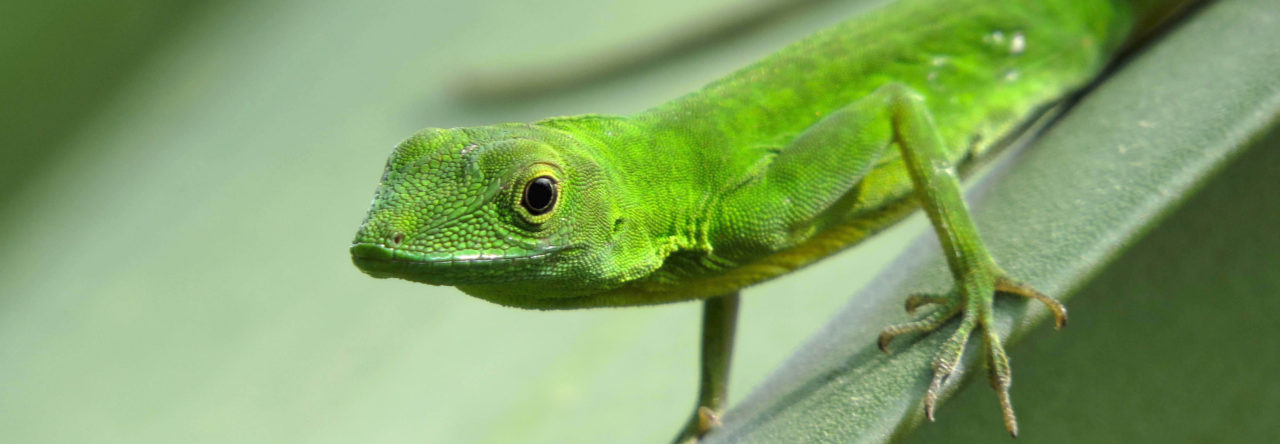Peter Uetz of the Reptile Database fame sends the following Valentine’s Day greetings:
 If you or your significant other loves anoles, you may want to show her/him this hearty Anolis distichus (Figure 2960, above) on occasion of today’s Valentine’s Day. It clearly shows a heart on it’s head. Some other specimens such as the couple in Figure 3297 (right, from locality 1 in the Google map), also show a heart although it’s not as pronounced. Also note their blunt coloration which doesn’t seem to affect their affection.
If you or your significant other loves anoles, you may want to show her/him this hearty Anolis distichus (Figure 2960, above) on occasion of today’s Valentine’s Day. It clearly shows a heart on it’s head. Some other specimens such as the couple in Figure 3297 (right, from locality 1 in the Google map), also show a heart although it’s not as pronounced. Also note their blunt coloration which doesn’t seem to affect their affection.
Anolis distichus is pretty variable and even within this subspecies, A. d. dominicensis Reinhardt & Lütken 1863, to which all these specimen belong, there is considerable variation. By the way, the guy with the heart (Figure 2960) is from the same locality 3 as two other specimens which do not have a heart (Figures 2948 and 2968) although they display a similar shape on their heads. Figure 3087 shows yet another specimen for comparison, this time from locality 2.
Various authors have described a dozen subspecies from Hispaniola (reviewed in Schwartz 1971, see map 2 from that paper). The northern half of Hispaniola is almost entirely in the hands of A. d. dominicensis, hence the specimens on the photos have been assigned to that subspecies.
Note that Glor & Laport 2012 elevated several Dominican subspecies of A. distichus to full species level, namely A. dominicensis, A. favillarum, A. ignigularis, A. properus, and A. ravitergum. The Reptile Database hasn’t followed this yet because their geographic sampling was limited to relatively few localities and they did not provide any updated diagnoses (but their recommendations have been recorded in the database). Also, there seems to be hybridization among several of these populations.
Photo localities:
2948: 3
2960: 3
2968: 3
3087: 2
3297: 1
Acknowledgments
Thanks to Miguel Landestoy and Luke Mahler who helped with the IDs.
References
Glor, Richard E.; Robert G. Laport 2012. Are subspecies of Anolis lizards that differ in dewlap color and pattern also genetically distinct? A mitochondrial analysis. Molecular Phylogenetics and Evolution 64 (2): 255-260. http://www.sciencedirect.com/science/article/pii/S1055790310004276
Schwartz, A. 1968. Geographic variation in Anolis distichus Cope (Lacertilia, Iguanidae) in the Bahama Islands and Hispaniola. Bull. Mus. comp. Zool. Harvard 137 (2): 255- 309. http://biodiversitylibrary.org/page/4784182
Schwartz, A. 1971. Anolis distichus. Catalogue of American Amphibians and Reptiles (108)
(used to be available online at ZenScientist, and maybe soon at the SSAR website again).
Anolis distichus in the Reptile Database
http://reptile-database.reptarium.cz//species?genus=Anolis&species=distichus
(an extended synonymy and distribution section will appear in the next database release)
The database entry also has another 43 references most of which are available online.
- Evolution in Real Time on Lizard Island - March 23, 2025
- Spider Snags Adult Anolis osa - March 22, 2025
- An Homage to the Green Anoles of New Orleans - March 21, 2025







Justin
Living in the Carolinas, I’ve really taken this genus for granted. This site has really given me more of an appreciation for Anolis lizards and I really enjoy coming on here periodically and reading all the new stuff about them.